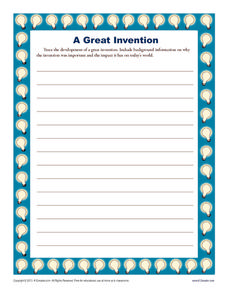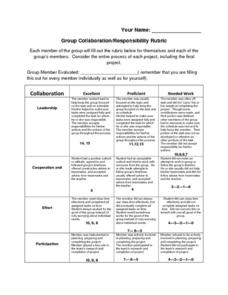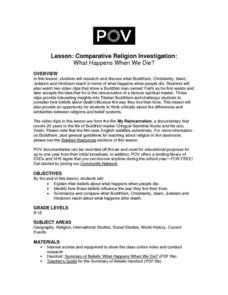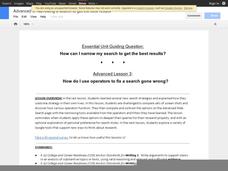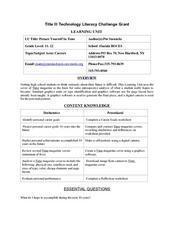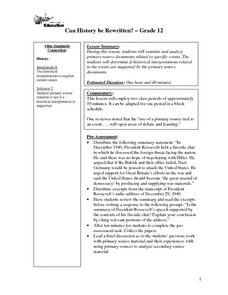Indian River State College
Argumentative (Persuasive) Essay Guidelines
Here is a handout that outlines six great steps to structuring an argumentative essay, which can be continually referenced as you teach your class about persuasive writing.
K12 Reader
A Great Invention
Try out a writing prompt that is great for a warm-up or an in-depth research project! Have kids describe an important invention and trace its development over the years. Use the writing prompt in a language arts class, social studies...
Sharp School
You Can't Buy Love - But You May Need Toilet Paper
What will I be? What do I want to be? What will I have to do to achieve this goal? These are the essential questions that launches a research project that asks like-minded individuals to identify their goals, the costs of the practical...
The New York Times
Making Do: Learning and Growing Through Adversity
What is it that makes people keep going when they face challenges in life? Ask your class to consider this question in relation to their own experiences and as they read material from The New York Times. Using personal experiences...
The New York Times
News and News Analysis: Navigating Fact and Opinion in the Times
Help your class understand the difference between fact and opinion by exploring the New York Times homepage and articles. In pairs or small groups, pupils complete a scavenger hunt, answering the provided questions. Next, discuss the...
The New York Times
Decision Point: Understanding the U.S.’s Dilemma Over North Korea
Simulate the Situation Room and analyze the US's relationship with North Korea. The plan starts off with a quick review and an examination of a online timeline that updates as the situation continues. Next, the class reads an article and...
American Documentary
Comparative Religion Investigation: What Happens When We Die?
How do different religions offer explanations for what happens when we die? Invite your learners to consider the variance and complexity of religious beliefs, and to research and compare/contrast the concept of death and afterlife...
The New York Times
Looking for Answers: Making Sense of the Boston Marathon Bombing
How should America respond to acts of domestic terrorism? What motivates or prompts a terrorist attack? After reading an opinion piece on the 2013 Boston Marathon bombing, your learners will critically analyze factors that could have...
Curated OER
Vocabulary Comic Strips
Who says comic strips aren’t educational? Prove these naysayers wrong by asking your class members to create a comic strip for a selected vocabulary word. Using online technological tools that provide access to an array of options for...
Google
Beginner & Intermediate 5: Evaluating Credibility of Sources
Convey how to determine appropriate and credible online sources with a series of three lessons. After completing the lessons, class members will know what kinds of sources to use, how to identify credible sources, and how tone and style...
Google
Advanced 5: Evaluating Credibility of Sources
How do discerning readers determine bias and credibility? Ask small groups to figure it out! First, each group is provided with either articles or videos that contain bias. They examine the resources, respond to included questions, and...
Google
Advanced 4: Searching for Evidence for Research Tasks
Research was very different in the past. Pupils once had difficulty finding sufficient information, but now they have the opposite problem. Show your class how to pick the best resources out of the millions of sites an online search will...
Google
Advanced 2: Understanding Search Results
Effective researchers use a variety of techniques to find what they need online. Pupils who complete the activities listed here should already have an arsenal of strategies for searching. They will learn about and practice two new...
Google
Advanced 3: Narrowing a Search to Get the Best Results
Familiarize your class with Google operators, specific symbols, or words they can use to express more clearly to the search tool what they want to find. With the resources included here, they can test their previous knowledge, view...
Southern Nevada Regional Professional Development Program
Was Bias A Factor? Make an Argument
The ability to analyze an argument is a skill emphasized by the Common Core standards. Offer your class an opportunity to develop and hone their skills by providing them the testimonies in an Oregon court case. After reading the facts of...
Curated OER
What Are the Advantages and Disadvantages of Conforming?
Dive into Arthur Miller’s The Crucible and determine what it means to conform in society, and discuss as a group with the thoughts and plans available in these documents. Included are multiple activities and brain targets that form the...
Curated OER
Picture Yourself in Time
A super activity that integrates technology and career exploration! High schoolers use graphic organizers and brainstorming to first analyze Time Magazine covers, then they think about what they want to be doing in 10 years. They...
Curated OER
Social Studies: Essay Outline
Here is a resource intended for a social studies class, but great no matter the subject. It's a complete outline for an essay. It includes space to write ideas related to the thesis, supporting details, transition sentences and words,...
Curated OER
Writing Effective Thesis Statements and Introductory Paragraphs for Research Papers
After reading on the topic of their paper, high schoolers work in pairs to assess how to write powerful, precise thesis statements. The introduction contains three statements: a universal statement, a bridge statement, and a thesis...
Curated OER
Formal versus Informal Language
Engage in an activity that focuses on the concepts of formal and informal language use. Middle and high schoolers compare and contrast each style by using a Venn diagram that includes some examples. They read and hear a passage of lyrics...
Curated OER
Can History Be Rewritten?
Can history be rewritten? Or, more precisely, is history documented accurately? High school juniors and seniors compare primary source material with secondary sources. For example, they compare President Roosevelt's December 29, 1940...
Curated OER
About Life: The Photographs of Dorothea Lange Going to the Promised Land
To better understand the migrant experience during the Great Depression, pupils analyze two primary resources: photographs by Dorothea Lange and a U.S. Map that shows the Dust Bowl. They compare and contrast Lange's images to Steinbeck's...
American Library Association
Creating 21st Century Superheroes
Create 21st century learners by utilizing technology and library databases. Scholars explore the concept of comic books as literature and create a superhero who could uniquely solve a 21st century global issue. Databases such as SIRS are...
National Endowment for the Humanities
Practical Criticism
As an introduction to literary criticism, class members recreate I.A. Richards' close reading experiment. Individuals select a poem, paraphrase the story, focus on the imagery used, consider what the imagery adds to the tale, and...



